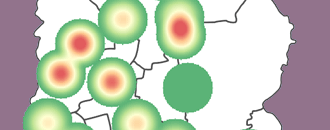
GeoHealth Mapping GIS Training
for Monitoring and Evaluation or
Strategic Information Officers and Data Analysts for HIV
While mapping health-related data offers tremendous promise by identifying and reaching people who are most at-risk for HIV, international public health professionals find themselves facing a double-edged sword. Matching the geography of key populations to programs and life-saving services is a powerful weapon in the fight against HIV; however, this approach risks putting data about individuals and services in the hands of those who might inflict harm. This risk is especially pronounced in countries with legal restrictions and/or rights-constrained environments—for example, where same-sex relationships, sex work, or injecting drug use are criminalized, or where identifying as transgender is either criminalized or simply unacceptable.
Before beginning any mapping or spatial analysis, analysts, program managers, and decisionmakers should review available resources regarding ethical considerations in programmatic mapping. This will ensure that any analysis will directly inform policies or programs, that it is presented at an appropriate level of aggregation to protect individuals and communities, and that the maps themselves are shared selectively.
Additional guidance on this topic can be found at
- Burgert, C.R., J. Colston, T. Roy, and B. Zachary. 2013. Geographic Displacement Procedure and Georeferenced Data Release Policy for the Demographic and Health Surveys. DHS Spatial Analysis Reports No. 7. Calverton, Maryland, USA: ICF International. Available at http://www.dhsprogram.com/publications/publication-SAR7-Spatial-Analysis-Reports.cfm#sthash.57s11ryj.dpuf.
- amfAR, International AIDS Vaccine Initiative, Johns Hopkins Bloomberg School of Public Health, and UNDP. 2011. Respect, Protect, Fulfill. Best Practices Guidance in Conducting HIV Research with Gay, Bisexual, and Other Men Who Have Sex with Men (MSM) in Rights-Constrained Environments. New York : amfAR. Available at http://www.amfar.org/uploadedFiles/_amfar.org /In_The_Community/Publications/MSMguidance2011.pdf.
- VanWey, L.k., R.R. Rindfuss, M.P. Gutmann, B. Entwisle, and D.L. Balk. 2005. "Confidentiality and Spatially Explicit Data: Concerns and Challenges." Proceedings of the National Academy of Sciences of the United States of America 102 (43): 15337–15342. Available at http://www.pnas.org/content/102/43/15337.abstract.
- MEASURE Evaluation GIS Working Group. 2008. Overview of Issues Concerning Confidentiality and Spatial Data. Chapel Hill, NC: MEASURE Evaluation. Available at http://www.cpc.unc.edu/measure/publications/wp-08-106.
- Sherman, J.E. and T.L. Fetters. 2007. "Confidentiality Concerns with Mapping Survey Data in Reproductive Health Research." Studies in Family Planning 38(4): 309–321. Available at http://www.ipas.org/~/media/Files/Ipas%20Publications/ShermanSFP2007.ashx.
